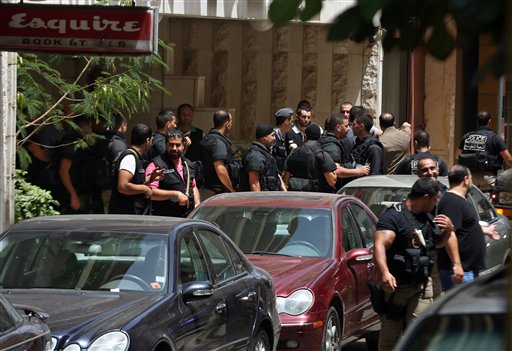BEIRUT (AP) — A suicide bomber detonated his vehicle Friday near a police checkpoint in eastern Lebanon, while troops raided two hotels in the capital, arresting 17 suspected members of an al-Qaida breakaway group allegedly plotting terrorist attacks in the country.
It was not clear if the two incidents were related. But the bombing — the first since March — along with the security dragnet in and around Beirut sparked fears of renewed violence in a country which has been buffeted by the conflict in neighboring Syria.
Al-Qaida-inspired militants have claimed bombings in the past, particularly against the Shiite group Hezbollah. Still, Friday’s bombing was the first in several months, suggesting a possible link to events in Iraq, where the al-Qaida splinter group, the Islamic State of Iraq and the Levant, has seized large chunks of territory in the country’s north.
A Lebanese security official confirmed that the arrests in Beirut Friday netted suspected members of the group. He spoke to The Associated Press on condition of anonymity in line with security regulations.
A security report obtained by the AP suggested members of the group may have been planning multiple suicide attacks following Friday prayers in Beirut. It said at least one of the wanted militants was a Saudi national.
If the claims of the planned terrorist attacks turn out to be true, it would suggest that the group is expanding its operations beyond Syria and Iraq.
The security operation in Beirut’s bustling Hamra district began Friday morning. Dozens of security forces blocked roads leading in and out of the area before raiding the Napoleon hotel, where they detained several people. The men were seen being led into police vehicles, arms behind their backs, their faces covered with their T-shirts.
Security forces later entered another nearby hotel.
U.S. Ambassador David Hale meanwhile cancelled a visit Friday to the Foreign Ministry for security reasons, the National News Agency said. The U.S. Embassy and the United Nations refugee agency also canceled a meeting scheduled for Friday afternoon in Beirut.
The United States condemned the checkpoint bombing. “These attacks threaten the principles of stability, freedom and safety that the people of Lebanon are working hard to uphold, and we urge all parties to refrain from retaliatory acts that contribute to the cycle of violence,” State Department spokeswoman Jen Psaki told reporters.
A meeting organized by Lebanon’s Shiite Muslim Amal party scheduled to take place in Beirut was postponed. The party is headed by Parliament Speaker Nabih Berri, who was expected to attend the gathering. The event was scrapped based on a report of a planned terrorist attack received by the Interior Ministry, a security official said.
A few hours later, a blast struck the town of Dahr el-Baidar, at the entrance to eastern Lebanon’s Bekaa Valley on a busy highway that links the Lebanese and Syrian capitals.
Lt. Col. Joseph Msallam, a police spokesman, said the explosion killed an officer and wounded 19 people, including six police officers. Troops sealed the area around the explosion.
The official National News Agency said Maj. Gen. Abbas Ibrahim, the powerful head of Lebanon’s General Security Directorate, had driven past the site of the explosion in his convoy shortly before the blast. It was not clear whether he was the target. No one immediately claimed responsibility for the attack.
Syria’s civil war has spilled over into neighboring Lebanon on multiple occasions and inflamed sectarian tensions. A series of car bombs have struck Shiite areas across Lebanon, killing dozens of people.
The last explosion to hit Lebanon occurred on March 29, when a suicide bomber in an explosives-laden car targeted a Lebanese army checkpoint near the Syrian border, killing three people.
Hard-line Sunni groups have claimed responsibility for the attacks against Shiites, saying they are meant to punish the Lebanese Hezbollah movement for fighting alongside Syrian President Bashar Assad’s troops.
After Friday’s bombing, troops began enforcing strict measures at all entrances to Beirut’s southern suburbs, a Hezbollah stronghold, setting up checkpoints and searching cars.
Security forces also deployed at all the entrances to Beirut, preventing trucks from entering the Lebanese capital for fear of more bombings.
The Lebanese are deeply split over the civil war in neighboring Syria, with Sunnis largely backing the insurgency and Shiites siding with Assad.
___
Associated Press writers Bassem Mroue in Beirut and Matthew Lee in Washington contributed to this report.

COMMENTS
Please let us know if you're having issues with commenting.